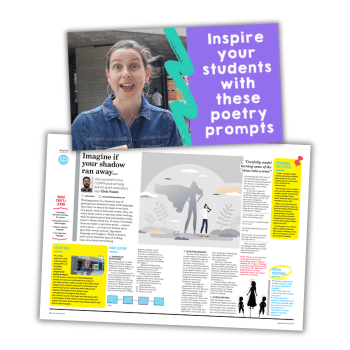This narrative poem lesson plan frees writers up to play with words, syntax, figurative language and imagery. It uses an intriguing prompt from a CLiPPA prize-winning poet to spark inspiration…
Writing poetry is a fantastic way of getting your students to play with language. Once they’ve learnt the basic structures of a poem, such as lines and verses, they can write freely and in a way that other writing, with its grammatical and punctuation rules, doesn’t always allow for.
Narrative poem learning objectives
- Develop a narrative structure for a poem
- Play with words to build imagery
- Explore sensory language
- Use figurative language
Starter activity
As a class, watch our video featuring poets posing different intriguing questions. This lesson focuses on poet Kate Wakeling’s prompt, but you can easily adapt these ideas to suit some of the other prompts from the following poets:
Kate’s prompt is this: What would happen if your shadow unhooked itself from you and went off and spent a whole day alone? What would happen if the whole world’s shadows were unhooked from the objects they link to?
Ask children to close their eyes and think about what would happen if their shadow could unhook itself and explore the world. Where would it go? What would it see? Share initial thoughts.
Use an existing poem to show how the writer has split it up into verses. Explain that in a narrative poem, we still use verses, but these verses can tell a story.
Model how you can transpose a narrative poem’s verses moving down the page onto a story timeline. Where does the shadow start? Where does it go next? Aim for a minimum of four verses and a maximum of six.
Gather ideas from the class and plot them onto a timeline
Chris Youles is an assistant head and author of the bestselling books Sentence Models for Creative Writing and Teaching Story Writing in Primary. He has been an English lead, writing moderator and a specialist leader in education.
This lesson is perfect for National Poetry Day in October. Kate Wakeling, Valerie Bloom and Stephen Lightbown were nominated in the 2024 CLiPPA, alongside Julio Serrano Echeverria and winner Matt Goodfellow. Laura Mucha was a judge, alongside Liz Berry, Darren Chetty, Billie Manning and Imogen Maund. The CLiPPA is the only award that celebrates outstanding poetry published for children in the UK.

Similar resources
- No Refuge – Graphic novel activities about refugees for UKS2
- Short story writing – Author-led resources for KS1 and KS2
- Christmas activity sheets – KS1 / KS2 fun & educational printables
- Learning gaps – How to ensure no pupil drifts too far
- Writing horror – Write a scary scene with Fear Files: Hide & Seek










